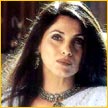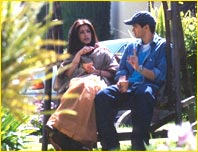
|
Do women have a sexual identity in Bollywood?
Hindi filmmakers are judgmental towards older women
|
Deepa Gahlot
With V K Prakash's Freaky Chakra coming up, the number of films in recent times dealing with the younger man-older woman relationship has shot up one more.
Everybody seems to hail this as a 'bold,' 'mature' trend, because save for a tiny number of films in the past (Doosra Aadmi, Ek Nai Paheli, Saaz, Maya Memsaab, Khiladiyon Ka Khiladi, Bada Din), and some of the usual student-infatuated-with-teacher sequences in films like Mera Naam Joker, Rockford, Yeh Kya Ho Raha Hai, this aspect of romance has not been done to death like the teen love story.
Also, unlike the West, where older woman-younger man romances and marriages are not so uncommon, there is still some shock value attached to it here. Though, of course, nobody ever bats an eyelid at older man-younger woman relationships.
Of late, films like Dil Chahta Hai, Ek Chhotisi Love Story, Leela and now Freaky Chakra have touched on this theme, but in a curious way, they all use stereotypes.
The older woman has to be single/dysfunctional/lonely/ crotchety. Her life has to change for the better when the young man steps in, and, of course, there is the added advantage of sex without strings, relationship without commitment. Nobody in India would expect a romance like this to last.
And the woman, most of all, ought to have known that. If she breaks the rule, she has to be punished. Her feelings are not to be taken into account in the journey of a younger man's rite of passage.
So in Dil Chahta Hai, the drunken divorcee (Dimple Kapadia) who attracts the young artist (Akshaye Khanna) --- oddly enough, director Farhan Akhtar sidestepped the issue of sex --- dies of cirrhosis of the liver. The hero is now free to seek a healthy relationship with a suitable young woman who is seen on the horizon as the film ends.
In Ek Chhotisi Love Story a teenager watches a woman (Manisha Koirala) through a telescope all the time. The woman is single, has a boyfriend with whom she has raucous sex, walks around half dressed, and seduces the young boy. Director Shashilal Nair sees her, or expects the audience to see her, as a corrupter of innocence and condemns her to a lonely life of remorse.
In Leela again, the woman (Dimple Kapadia) is visiting a professor in the US with an 'open' marriage to a poet. Open to the extent that he has affairs she overlooks. In a moment of rage, she sleeps with her Indian student (Amol Mhatre) who has a cultural identity crisis, a broken home and pals who keep goading him to lose his virginity.
 He wins a bet by falling into bed with the teacher, but the act triggers off a chain emotional reaction. His mother is furious ("Of all the things you could have taught him, you chose sexual initiation"); his father pleased; Leela's husband strangely blase ("I believe you slept with my wife, she thinks very highly of you)."
He wins a bet by falling into bed with the teacher, but the act triggers off a chain emotional reaction. His mother is furious ("Of all the things you could have taught him, you chose sexual initiation"); his father pleased; Leela's husband strangely blase ("I believe you slept with my wife, she thinks very highly of you)."
And Leela, of course, embarks on a much belated journey of self-discovery, minus husband or young suitor.
Freaky Chakra has a cantankerous widow (Deepti Naval), pretty much like Shabana Azmi's ill-tempered Catholic landlady in Bada Din, who wants to be left alone, but welcomes sexually explicit phone calls from a neighbour. When a teenager walks into her house demanding PG accommodation, she agrees and transforms into a cheerful coquette.
Since all this is happening in a writers imagination, it is done with a lot of cheeky humour. The writer falls in love with the woman and tries to dislodge the boy he had sent into her life to end her boredom.
Almost all these films portray the older woman as a pitiable creature whose life is enhanced by a man's presence. It must be unthinkable for the Hindi filmmaker to think of a female character who is happy and fulfilled without conventional notions of 'love.'
Many years ago, K Balachander had taken up an unusual plot in which a man (Kamal Haasan) falls in love with an older woman (Hema Malini), while his father (Raaj Kumar) falls for the woman's daughter. In Europe or Hollywood this would have been material for a farce. Here, it is a matter of high tragedy.
There was another South Indian film, Ranganayaki, in which an actress softens towards a young fan who turns out to be the son she had left behind with her estranged husband.
 Doosra Aadmi had Raakhee getting attracted to a younger Rishi Kapoor because he resembles her dead lover. Maya Memsaab had the vaguely unhappy Deepa Sahi having an affair with a young man (Shah Rukh Khan); Khiladiyon Ka Khiladi had Rekha, a female don pathetically lusting after her younger sister's boyfriend (Akshay Kumar); Saaz had the atypical idea of a mother (Shabana Azmi) and daughter (Ayesha Dharker) falling in love with the same man (Zakir Hussain), who loves the older woman. That causes a rift between mother and daughter. And, of course, the relationship with the man has to end.
Doosra Aadmi had Raakhee getting attracted to a younger Rishi Kapoor because he resembles her dead lover. Maya Memsaab had the vaguely unhappy Deepa Sahi having an affair with a young man (Shah Rukh Khan); Khiladiyon Ka Khiladi had Rekha, a female don pathetically lusting after her younger sister's boyfriend (Akshay Kumar); Saaz had the atypical idea of a mother (Shabana Azmi) and daughter (Ayesha Dharker) falling in love with the same man (Zakir Hussain), who loves the older woman. That causes a rift between mother and daughter. And, of course, the relationship with the man has to end.
As Shabana Azmi pointed out in an interview, a mother is not allowed to have a sexual identity in Hindi films. She did get carried up to the bedroom by hunky Marc Robinson in Bada Din, the only film with a happy end to an 'odd' romance!
Hindi filmmakers cannot think beyond the obvious when it comes to relationships. Rituparno Ghosh in his Bariwali handled the theme of an older woman's (Kiron Kher, who also played a decrepit actress used and dumped by a younger man in Darmiyaan) loneliness and vulnerability to exploitation with tender sympathy.
The others have invariably taken the judgmental approach. What is not acceptable in the Indian social milieu is taboo. But Indian society --- at least in the cities --- has changed under their noses.
With change has come a completely new set of relationship rules and women who live on their own terms, never mind that filmmakers see them as sad and contemptible.
Movies in the West have moved on to the Bridget Jones formula in which 'singleton' careerwomen are objects of ridicule. How long before our filmmakers catch on to this one?
EARLIER COLUMN
Wanted film: zara hatke
E-mail Deepa Gahlot